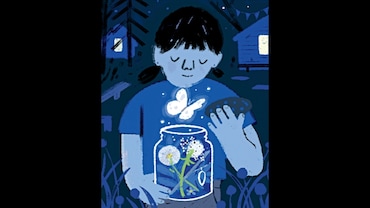- HOME
- /
- True Stories
- /
- My Story
- /
The Many Lives of Dabba
My mother used recycled yoghurt containers to share food—and love. Now I do the same.
 Jag Nagra
Jag Nagra
EVERY AUNTIE I KNOW has a kitchen drawer containing a carefully maintained collection of yoghurt dabbas. Dabba is a pan-Indian word for ‘box,’ but it refers to all manner of containers, too. Like the Hindu concept of reincarnation, dabbas live many lives; the 750-millilitre containers that hold the yoghurt we buy at the supermarket and eat every day are saved and washed, and washed again.
The reused dabbas end up storing leftovers, religious offerings and pot- luck contributions. They pass from house to house, living in their drawer, the fridge or the pooja room (often it’s actually a closet) where the morning prayers are recited. Sometimes they are even returned to their original owners, full of some other delicious food. This is a fairly advanced manoeuvre and one only the elder aunties manage— recognising their dabba from their friends’ seemingly identical container is nothing short of miraculous.
I grew up in a community of South Indian immigrants, and the manufacturer’s labelling on the dabbas was a source of information about the families they came from. Rich, fatty yoghurts might indicate a still-secret pregnancy, as women are routinely encouraged to eat everything (and I mean everything) when gestating. Low fat—or worse—non-fat yoghurt meant someone’s doctor had been talking about cholesterol. And sweetened, flavoured yoghurt? That was an abomination that didn’t bear mention.
WHEN I WAS a kid, we ate yoghurt with just about everything. Every few days, my mother made her own yoghurt, scalding milk on the stove and mixing in a spoonful of leftover curd, leaving it on a warm vent in the kitchen to set overnight. Dabba yoghurt (which was distinct from yoghurt dabbas because it referred to the contents rather than the container) was reserved for dinner parties, religious ceremonies requiring fresh yoghurt and the rare event of a failed batch of the homemade stuff.
My mother cut no corners when it came to food, grinding her own spices and grating fresh coconut by hand for elaborate meals—after a full day at the office. The leftovers would inevitably find their way into yoghurt dabbas, the refrigerator always full of options for late-night cravings.
But just as every auntie cherished her dabbas, every uncle hated them. My own father, a generally laid-back man, meticulously avoided the drawer of dabbas. “How many of these things can you possibly need?” he would ask my mother, exasperated. My mother would shoot him a look that would surely have killed a weaker man and place her dabba carefully back in its drawer. Occasionally my father would get fed up with the overflowing drawer and dispose of all the dabbas. But my mother would simply start the process of collecting them again.
WHEN I WENT away to university, my mom used to cook food and send it back with me with strict instructions to wash the dabbas and bring them home. I was embarrassed by my dabbas—why did we need to save these things? I weighed the options: if I recycled the dabbas, would she still send me food? I knew the answer was yes, but it was not a risk I was prepared to take. So, I washed the oil- and turmeric-stained dabbas in the common kitchen and just scrubbed harder when I felt the eyes of my roommates on me.
Eventually, I found my way to Halifax, where I’m a physician and have a family of my own. Like my mother before me, I’m also the proud owner of an extensive dabba collection, which I guard zealously. No matter how many glass, microwave- and oven-safe containers I have, no matter how beautiful and functional they may be, I compulsively collect yoghurt containers.
They truly are the most versatile of objects, with uses ranging from food storage to toys for my children: at the beach, in the bath, for endless Lego creations. It is a source of a strange and unnameable comfort. I don’t expect them back when I give them away, but a tiny part of me grieves when they go. I’m fairly certain that my friends just recycle them, but I still secretly hold out hope that they continue to be passed from house to house, living their multiple lives and perhaps, eventually, finding their way back to me.
When I married my husband, an American from Boston, my mother was concerned. “You know, you come from very different backgrounds,” she said. Navigating cultural differences is surely an adventure. But the other night, I heard my husband yelling in the kitchen, and the next morning, I found my dabbas in the recycling bin.
I narrowed my eyes a little as I fished them out, washed them up and replaced them in their drawer. I was practising my mother’s death stare.






